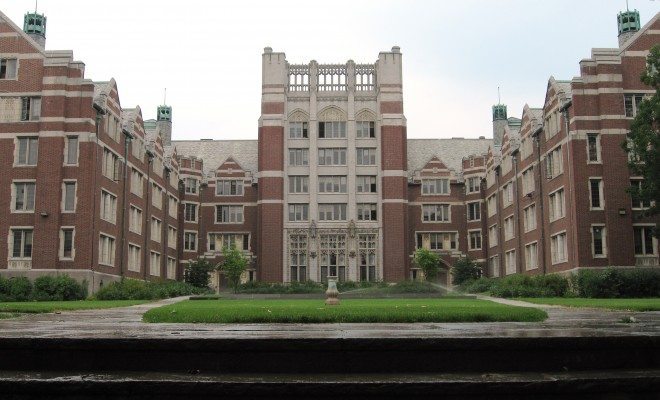 Image courtesy of [Jared and Corin via Wikimedia]
Image courtesy of [Jared and Corin via Wikimedia]
News
Universities Should Stay Away from Rape
It is sexual assault awareness month, and the accusations against Universities’ policies on sexual crime continue to come forth. Before we get caught up in the rage, maybe we should start by asking the obvious question: what role should universities actually play in handling sexual assault crimes?
At the current moment, universities handle sexual assault cases mainly in two ways. One, they either attempt to squash the complaints of the victims, because the mere appearance of sexual assault on campus is bad for business. Or two, universities process the accusations, commit to an investigation, and set a trial for the accused. This alternative option can be ‘beneficial’ for business, because it makes the university appear to be tough on ‘rape culture’. For obvious reasons, I have a serious problem with the first avenue of simply trying to downplay the accusations of a possible victim. However, there is good reason for us to be skeptical of the alternative.
Universities should have zero involvement in the initial handling of sexual assault crimes, and for the reason mentioned before: colleges can benefit from looking tough on rape culture, and thus, they may institute policies that ensure this desired outcome, at the harm of the school’s own students, specifically the accused. To be fair, universities are in a difficult spot. When you take into account that sexual assault is extremely present on college campus — Sarah Lawrence College reports, “at least 1 in 4 college women will be the victim of a sexual assault during her academic career” — and the fact that sexual assault cases are extremely hard to prove, many women or men can feel helpless and turn to the university to deal with situation.
However, this is also a problematic solution. Since universities have interests outside of justice, they could very easily lose sight of the fact that we assume innocence until proven guilty within our nation’s conception of justice. Unfortunately, we already see this trend starting to actualize, as there are many cases where men have been convicted of sexual assault by their university, while considered innocent in a legal context. Consider the case of Dez Wells where, “local authorities have gone so far as to proclaim the defendant’s innocence[ and yet, he was] expelled from Xavier University on a disciplinary charge of sexual assault.”
If universities begin to convict students of sexual assault crimes, without their guilt being proven in court, two new major problems arise. The first would be those who may be innocent still carry the weight of the conviction. A student like Wells will leave Xavier with no degree, and the marking of a sexual predator. This has profound implications. Wells will most likely struggle to be accepted into another University with an explosion from Xavier — due to sexual assault — on his record. (Dez Wells has since been accepted to University of Maryland, however, his value as an athlete may have helped him in this endeavor. However a student like Peter Yu at Vassar College, who was convicted and expelled in a similar manner, may not be so lucky). The second problem arises from the fact that someone like Wells will have to carry the psychological burden of being identified as a ‘rapist’, yet his innocence was proclaimed by legal authorities, therefore, he shouldn’t have this problem.
These worries make way for another implication of relying on universities to handle sexual assault crimes. Universities cannot offer due process nor due punishment. I feel as though there is no need to say that rape is a serious crime, but I think we forget that it is when we expect an institution like a university to process such an offense. There is a reason that ‘murder’ would never be processed solely on a university campus, for the simple reason that such a serious crime requires proper due process and punishment. It seems apparent to me that we should view sexual assault in the same light. To convict someone of a crime as serious as rape, they should be protected by legal safeguards. Additionally, to ensure that proper justice is served, in the event that sexual assault was committed, we can only rely on the legal system to ensure the proper level of moral reciprocity.
These problems associated with colleges carrying out their own investigations and convictions of sexual assault crimes should deter us from demanding that they commit to action. We must remember that universities have goals outside of upholding justice, which can lead to unfair trials and convictions, ultimately harming students. Thus, students and activists against sexual assault should refrain from pointing fingers at the university. Instead, we need to establish a new avenue that makes it easier to process sexual assault cases, but within the legal domain. This is the only way to ensure proper due process and justice, and treat rape like the serious crime that it is.
[Reason] [SLC] [ThinkProgress]Shortcode Generator
—
Bo Donoghue








Comments